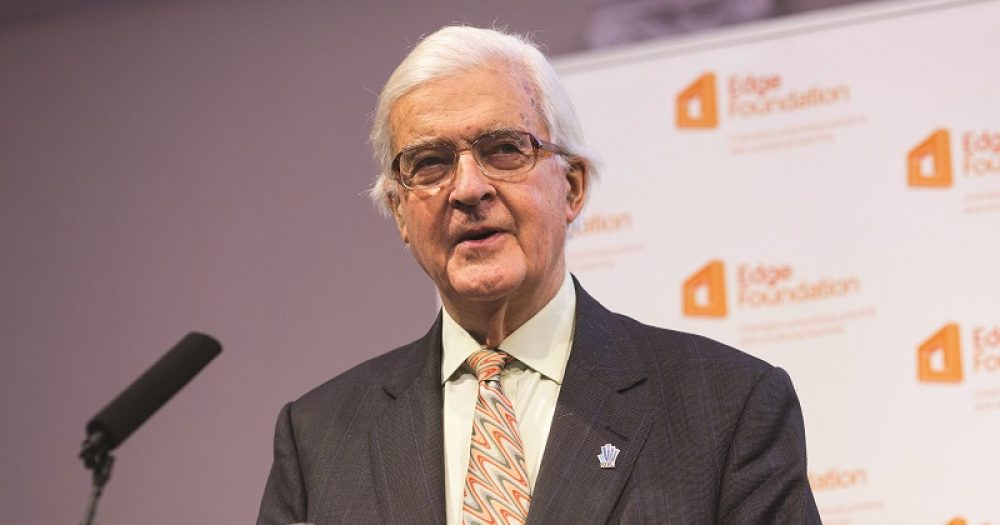The government’s schools bill is a “real grab for power” that will effectively make Nadhim Zahawi “the chief education officer” for thousands of schools, former ministers warned today.
The draft law is currently making its way through the House of Lords. It seeks sweeping new powers over schools which mean the Department for Education could dictate the make-up of trust boards, the length of the school day and even staff pay.
During its second reading today, former education secretaries and ministers expressed deep misgivings about the proposals, while Labour and the Liberal Democrats revealed plans to try to amend the legislation to require consultation on the new powers and greater transparency.
Lord Baker, education secretary between 1986 and 1989, warned that the bill “increases the powers of the secretary of state and the DfE in a way unprecedented since 1870”.
The bill would give the government the power to “make every academy sign an agreement with the secretary of state saying they will do what he says”, he claimed. New termination notices gave “secretaries of state the power to close schools which they never really had since 1870”, he added.
At present, the DfE can terminate individual academy funding agreements, but it wants more powers to intervene at trust level.
DfE ‘taking complete control’ with schools bill
“It’s a real grab for power by the Department for Education,” Baker warned. “You must remember that the DfE since 1870 has never run a school. Now they’re going to take complete control over the education system. And so I think they should be watched.
“This is really a game-changing bill of a very significant nature, and I think it’s totally unproved that the DfE actually knows very much about the improvement of schools.”
The government has set a target for all schools to be in academy trusts, or in the process of moving into them, by 2030.

Baroness Morris, who served as education secretary from 2001 to 2002, said the bill was trying to “remedy the faults” created by the coalition government, under which academy expansion was ramped up.
“The proposals in the bill on academies are incredibly tight. If you look down the list of powers which the secretary of state is taking to himself, they cover absolutely everything, from governors to the length of the day to the term to the curriculum.”
Morris said she was “in favour of multi-academy trusts”, which had “always been the godsend of a pretty awful piece of legislation” that expanded academy freedoms in 2002 and created “fragmentation”.
But “there are risks, and the lack of autonomy for schools within a multi-academy trust now is immense”, she added.
“In fact, what we’re doing in this bill is we’re making all academies maintained schools, and giving them all the restrictions that applied to maintained schools, but leaving them with the name of academy.”
‘Right problem, jaw-dropping solution’
Lord Knight, who served as schools minister in the Blair and Brown Labour governments, said the government had identified the “right problem” with academy agreements and a “multitude of contracts” between the education secretary and academies
“But the solution is jaw-dropping…making the secretary of state effectively the chief education officer for 25,000 schools.
“They’re not going to be in office forever. Do they really want to give future secretaries of state the power to do what on earth they like to schools in this country? Because that’s what this bill allows them to do.”
He said he saw the bill “potentially as the end of innovation in schools, the end of academy freedom”.
Lord Blunkett, who was education secretary from 1997 to 2001, said the bill had a “number of good elements”, but warned there was “so much left out”.
Accountability the ‘missing element’
He said “on the whole” he welcomed new powers to intervene in failing trusts, but the “missing element” was accountability.

“It’s about engagement of parents, it’s about governing bodies that have some role and power.”
Even Baroness Berridge, a Conservative peer who served as academies minister between 2020 and 2021, warned of “missed opportunities”.
She said she was “disappointed” the bill did not address “barriers that caused local authority maintained schools to get stuck and not transfer into the academies system”.
Former academies minister Lord Nash, who served from 2013 to 2017, also expressed misgivings.
Nash is currently the chair, a trustee and a controlling member of the Future Academies trust. His wife Caroline is also a trustee and member.
The government’s “strong preference” is that a majority of members are independent of the board of trustees.
Nash said he was “delighted” the government was promoting MATs, but said the sector was “very concerned about the far-reaching, vague and potentially draconian provisions that the government appear to be seeking in the bill in relation to intervention powers”.
Ex-minister criticises ‘draconian’ powers
“They are effectively seeking to tear up many of the existing funding agreements, which are clear contractual arrangements, and to give themselves the power to tear up the rest of them for any breach whatever, apparently, and replace them with vague and draconian powers, and to give the secretary of state very wide powers indeed to set standards.”
But Baroness Barran, the current academies minister, insisted the examples of new academy standards listed in the bill were were already covered in existing funding agreements, adding that the standards would “provide much more parliamentary and public scrutiny of the requirements placed on academy trusts”.
She also urged peers to “meet some of the multi-academy trust leaders in your areas”, adding that “the picture painted in many of the speeches tonight is not one that I recognise from the many schools that I have visited”.
The bill passed at report stage and will next be debated by a committee of the House of Lords, where amendments are likely to be tabled. It will next be discussed in June.
















Outrageously outdated ideas and control returning to Draconian measures. We need to be moving forward not backwards.
With all the consultations taking place, I feel the Department of Education forgot one major problem. What about discussing these proposals with the parents, as I feel this Bill (if passed) by the House of Lords is totally unfair to the parents.
[…] the Bill, using a list hosted by Education Otherwise and by Tap News. More detail is given by Schools Week, Wendy Charles-Warner and Tristram Llewelyn Jones, the latter two writing in The Conservative […]
[…] Education Secretary; an epoch of vastly expanded government control over schooling, has objected. Baker criticised the proposals for increasing “the powers of the secretary of state and the DfE in a […]